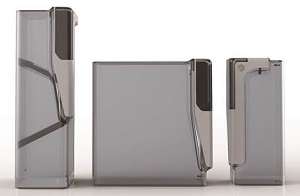SABIC continues to collaborate with the designers of today and tomorrow early in product development to enable materials innovation throughout diverse industries.
Most recently, the company worked with the College for Creative Studies (CCS) in Detroit, Michigan to develop the “Design for Safety” workshop, an intensive 5-week program for students in the College's MFA in Interdisciplinary Design program. This unique program challenged students to use SABIC’s high performance LEXAN™ resin to develop innovative, business-ready design concepts that focus on safety issues across diverse industries. SABIC’s participation with CCS speaks to the company’s on-going efforts to develop deep relationships within the design community, which will enable innovation now and into the future. The workshop served as a valuable experience for the students, who learned the importance of collaborating with material suppliers throughout the design process, particularly in the early phases, when materials identification and selection can take projects in new and creative directions.
 College of Creative Studies (CCS) design students win “Design for Safety” workshop competition with innovative, lightweight design for aircraft transport cases using SABIC’s versatile LEXAN™ resin.
College of Creative Studies (CCS) design students win “Design for Safety” workshop competition with innovative, lightweight design for aircraft transport cases using SABIC’s versatile LEXAN™ resin.
“We were eager to facilitate an opportunity where future designers could explore the possibilities of the LEXAN resin portfolio in multiple industries and settings,” said Tony Cerruti, Americas Regional Marketing Director. “We chose to partner with CCS because of its unique emphasis on developing both design and business expertise. This dual focus gives CCS students the ability to generate ideas that can have a real impact—ideas with a defined value proposition that could potentially be developed for our customers.”
During the workshop, students were coached through three project phases: discovery (research), ideation (ideas and concept development) and execution (prototype development). Working closely with their instructors, the teams learned to apply market research and entrepreneurial fundamentals while following a multi-phase project plan to deliver a successful outcome. The workshop culminated with a competition featuring submissions from four teams to a panel of judges, which included members of the design community, CCS and SABIC.
“By working alongside a materials solution provider like SABIC, this workshop gave our students the valuable experience of collaborating with industry stakeholders throughout the various stages of the design process and developing concepts that meet practical needs in an innovative way,” said Joanne Healy, Dean of Graduate Studies at CCS.
LEXAN Resin Portfolio Enables Unique Design Concepts
With virtually limitless options for geometry, color, texture, and transparency, LEXAN resin offers extraordinary design freedom and can help designers bring their most imaginative ideas to life. LEXAN resin also offers excellent heat and chemical resistance, lightweight durability, impact resistance and performance in extreme environments, making the portfolio ideal for the concept of this safety focused workshop.
The winning team of Peng Zhan (CCS), Tung Ting Kan (Hong Kong Polytechnic), Elisabeth Hoelzl (FH Joanneum) and Russell Meschler (CCS) presented a solution to improve the air travel experience. Current FAA regulations prohibit certain items like liquids or small sharp objects from being brought onto airplanes, which can result in passengers having to leave some carry-on valuables behind. The team developed a durable, transparent and lightweight transport case using LEXAN resin and featuring a remote-controlled locking system that would be allowed through security and onto the plane. The case could only be opened using an encrypted mobile application once the passenger arrived at their final destination. The team strengthened their business case by presenting a comprehensive implementation plan and identifying ways for the solution to be translated to address issues within other industries, including the international courier service where secure shipment of confidential or sensitive goods is required.
There is a growing need to more safely deliver and distribute humanitarian supplies in disaster zones. The runner-up team presented a design concept for a polycarbonate airdrop container to address this increasingly critical need The versatility of LEXAN resin in this application can help provide a lightweight, durable, and recyclable product that is stackable and easily transportable—a significant improvement from the product currently in use which is heavy, difficult to assemble, and can be dangerous to the people receiving supplies.
In addition to the CCS workshop, SABIC has participated in similar research and design competitions. Collaborating with London’s Royal College of Art (RCA) in two programs —VISIcON and PLASTicon — RCA students were invited to explore new applications of SABIC plastic technologies in vehicle design. Through these relationships, SABIC continues its commitment to collaboration with the design community early on in the product innovation cycle, stretching materials technology and design boundaries.